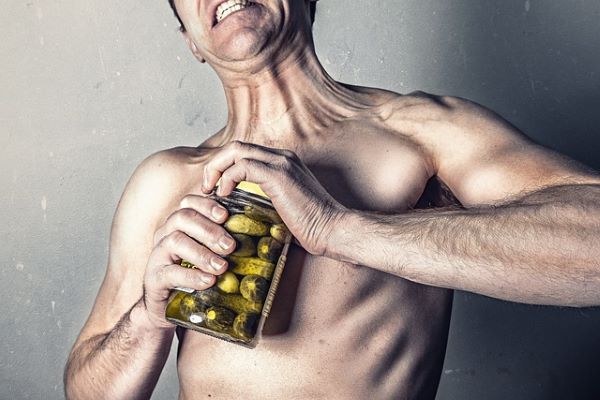Poor sperm quality is becoming increasingly common. There are valid medical issues that can have a detrimental effect on the quantity and quality of sperm produced, even though researchers are working to identify and inform the public about environmental reasons.
Poor sperm quality or low sperm count, also known as oligospermia, describes the reduction of sperm in semen during ejaculation, whereas azoospermia describes the total absence of sperm in semen.
The most crucial thing to understand is that a poor result is not necessarily indicative of infertility.
As sperm can fluctuate, it’s essential to understand that an abnormal test result might actually be normal. Additionally, a semen analysis must test abnormal twice to be considered truly abnormal. Source
The following are some of the main causes of a declining sperm count:
Being Obese or Overweight
Overweight and obese men have much lower sperm quality than men of normal weight. Researchers aren’t sure why, but they believe hormone imbalances caused by obesity, excess heat surrounding the testicular area, and/or other hormone abnormalities may be caused.
As body fat levels rise, so does leptin production, which reduces testosterone production. This translates to decreased testosterone levels in obese males with high leptin levels, which affect sperm production, sex drive, and erectile function. Source
Also Read: What Is Sexual Health and Sexual Wellness? What Does it Mean? Why Does It Matter?
Drug, Alcohol, or tobacco consumption
Alcohol usage, which can negatively impact testosterone levels and reduce sperm production, is another factor in the decline in sperm count. Tobacco use is also linked to oxidative DNA damage, increased
cadmium levels, and decreased fertility, all of which prolong the time it takes for couples to become pregnant. Additionally, smoking lowers sperm creatine kinase activity, which affects sperm motility and energy homeostasis.
Alcohol, drug, or tobacco use must be avoided at all costs. Since it is challenging to abruptly break this habit, one must first attempt to reduce intake before quitting gradually. Source
Hormone Disorders
The generation of the particular hormones necessary for healthy sperm production is mostly dependent on the pituitary gland, hypothalamus, and testicles. Sperm production will be impacted by hormonal imbalance. A hormone imbalance resulting in male infertility can also be brought on by thyroid and adrenal problems.
Different glands, including the hypothalamus, thyroid, pituitary, prostate, and testicles, can be impacted by hormonal imbalances. Sperm production or quality can decrease if any of these are disrupted. Source
Stress
The shift in working hours and way of life has had a significant impact on many people’s lives. The sperm count is most likely to be impacted by lengthy, stressful work days and a disrupted sleep cycle.
Stress, according to studies, may induce the release of steroid hormones such as glucocorticoids, which can lower testosterone levels and sperm production. Another option is oxidative stress, which has been demonstrated to negatively impact fertility as well as sperm and sperm quality.
It’s crucial to lead a healthy lifestyle and get enough sleep. To provide the body with the proper amount of rest, one must get at least 7 hours of sleep. Source

Infections
Certain infections may interfere with sperm production or result in scar tissue that prevents sperm from exiting the penis. These include Chlamydia sex-related illnesses like gonorrhea or HIV as well as inflammation of the testicles or epididymis (orchitis). Prostatitis (inflamed prostate) and other urinary tract infections can also possibly be the source of the problem. Source
Depression
It is a relatively prevalent condition that might have a detrimental impact on sperm concentration in the reproductive system. Male depression may affect fertility for a variety of reasons, such as decreased libido, erectile dysfunction, delayed or suppressed ejaculation, a decrease in the number of sexual encounters, or even a poor change in sperm quality.
Since stress is the main contributor to depression, it’s critical to control it. To create a healthy atmosphere, one must also lead a healthy lifestyle and nutrition. Source

Problems with Ejaculation
A man will have a low sperm count if he is unable to ejaculate or experiences retrograde ejaculation, in which the semen enters the bladder rather than existing at the tip of the penis.
Ejaculatory problems can be a side effect of medications called alpha-blockers, which are frequently prescribed to treat high blood pressure. They can also be caused by a number of medical illnesses, including diabetes, a history of bladder or urethra surgery, spine injuries, or spinal cord injuries. Source
Overheating the Testicles
Increased testicular metabolism brought on by higher temperatures damages sperm. When exposed to excessive heat, sperm cells typically perish. Continuously being exposed to higher temperatures can reduce sperm production or result in the development of sperm cells with aberrant shapes, both of which can lead to infertility.
Wear loose clothing, especially innerwear, as a precaution. Boxers should never be worn instead of briefs because doing so raises the amount of FSH (follicle-stimulating hormone). Another thing to avoid is spending a lot of time using a laptop. Source
Also Read: 5 Common Health Problems in Men of All Ages
Chromosome Defects
The male reproductive organs might grow abnormally due to some genetic abnormalities. The most common cause of abnormal chromosomes is a mistake during cell division. Chromosome abnormalities are usually produced by one or more of the following: errors in sex cell division (meiosis), errors in other cell division (mitosis), and so on. Source
Radiation or X-ray
Radiation can kill sperm cells as well as the stem cells that create sperm. Pituitary gland damage from radiation therapy to the brain can result in less testosterone and sperm production. Testicular shielding, a treatment for treating some malignancies, can shield the testicles from radiation.
There are procedures like gonadal shielding that can insulate the testicles from radiation. Source





